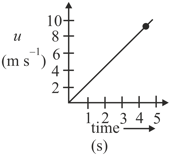EASY
JEE Main
IMPORTANT
Earn 100
A stone is dropped from the top of a building. When it crosses a point below the top, another stone starts to fall from a point below the top. Both stones reach the bottom of building simultaneously. The height of the building is :
(a)
(b)
(c)
(d)
66.67% studentsanswered this correctly

Important Questions on Kinematics
EASY
JEE Main
IMPORTANT
If , the angle between and is . The value of will be ___.
EASY
JEE Main
IMPORTANT
A boy pushes a box of mass with a force on a frictionless surface. If the box was initially at rest, then _______ is displacement along the -axis after
MEDIUM
JEE Main
IMPORTANT
The trajectory of a projectile in a vertical plane is where and are constants and are respectively the horizontal and vertical distances of the projectile from the point of projection. The angle of projection and the maximum height attained are respectively given by
EASY
JEE Main
IMPORTANT
A scooter accelerates from rest for time at constant rate and then retards at constant rate for time and comes to rest. The correct value of will be :
EASY
JEE Main
IMPORTANT
Train and train are running on parallel tracks in the opposite directions with speed of and , respectively. A person is walking in train in the direction opposite to its motion with a speed of . Speed of this person as observed from train will be close to: (take the distance between the tracks as negligible)
MEDIUM
JEE Main
IMPORTANT
A tennis ball is released from a height and after freely falling on a wooden floor it rebounds and reaches height . The velocity versus height of the ball during its motion may be represented graphically by: (graphs are drawn schematically and on not to scale)
MEDIUM
JEE Main
IMPORTANT
Starting from the origin at time , with initial velocity , a particle moves in the - plane with a constant acceleration of . At time , its coordinates are . The values of and are, respectively:
EASY
JEE Main
IMPORTANT
The speed verses time graph for a particle is shown in the figure. The distance travelled (in ) by the particle during the time interval to will be __________.

